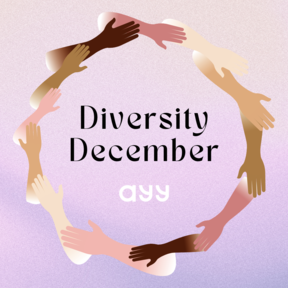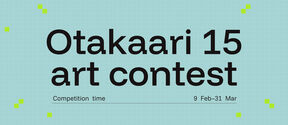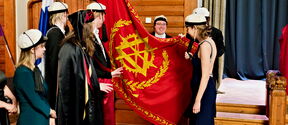Diversity December

Updated on Dec 20th
December 2nd - International Day for the Abolition of Slavery
Slavery and racism are intricately linked. Where slavery has appeared, so has the idea that those enslaved are somehow “other,” “not equal,” or “inferior,” and thus, to be afforded different treatment and rights. Even though Finland did not officially part in the slave trade, the mode of thinking that made some people worth less than others was dominant here, too. For example, in the 1700s it was still possible to hang a member of the Finnish Romani population without a trial.
The early to mid-1800s saw the abolition of slavery throughout the Global North, after roughly three centuries of trading in black bodies. But this was not the beginning of global equality.
In 1883, Sir Francis Galton categorized humans in terms of “races,” ranking these categories in order of norms of intelligence, beauty, and attributes desirable to white people at the time. He placed white-skinned people at the top as having all these desired features, and black-skinned people at the bottom, with other people of color were along the scale. Biased, much?
And yet, these ideas spread through the white scientific community like wildfire, and remained there for decades, spawning a vast body of ‘scientific’ research, especially in the field of medicine, called eugenics. Even though the scientific community discredited eugenics by the 1930s, the idea continued to live on, maintaining white power and privilege over other ‘races.’
In the 1940s, under Hitler’s leadership, the ethnic cleansing of Jews and the Romani was based on eugenics, and this has certainly affected the experience of discrimination faced by the Finnish Romani, too.
In 1981, the last forced sterilization of a Native American happened in the USA.
In Australia, forced sterilizations are still legal, despite frequent calls by the U.N. to end the practice.
According to the Being Black in the EU study, black people encounter the most physical violence in Finland, out of the studied countries. In A THL study (in Finnish) 68.7% of Finnish Romani answered that they had experienced discrimination within the past five years.
Aalto students are members of the global scientific community, and as such, we are responsible for examining our own thoughts and actions for unconscious bias. Things that seem scientifically sound now may have serious repercussions down the line. Fortunately for us, we also have more knowledge and more tools at our disposal than any other generation before us.
How do I consider people’s origins and ethnicity in my own thinking and communication? Find out more by signing up for our “Language of Inclusion” training on December 21, 2021.
A huge thanks to Leif Hagert for brainstorming with us!
December 3rd - International Day of Persons with Disabilities
Did you know that disability and academia have a long and troubled history? Many of the world’s oldest universities were set up near or even contained ‘mental asylums.’ People with mental disabilities were previously seen as perfectly ethical test subjects for experiments in medical and psychiatric science.
Universities have also traditionally been a space for able-bodied people. Many university buildings are not truly accessible because, for example, classical university aesthetics had high stairs, and modern accessibility improvements have not been made enough. To this day, people with disabilities are under-represented in universities. Many universities are also hesitant to invest in accessibility by design, and instead, opt for ‘retrofit’ solutions that single out students with disabilities. Retrofit solutions include, for example,
-
ramps for wheelchairs leading to a backdoor entrance
-
a professor asking students to inform them if articles to be compatible with a pdf audio reader (instead of just providing such a file to begin with)
-
complicated instructions, then asking students to ask if they need simpler ones.
The good news is that some of these difficulties have been addressed during the Corona pandemic, with the introduction of increased online accessibility across the board. What remains to be seen is whether students with disabilities will be better represented in our community after Corona.
How can I communicate in a way that includes my peers with disabilities? Find out more by signing up for our “Language of Inclusion” training on December 21, 2021.
December 10th - Human Rights Day
Sexual rights are human rights. This means that we all have the right to determine and express our own gender and sexual identity. However, those who are lesbian, gay, bisexual, transsexual, queer or belong to any other minority transgressing sexual and gender norms face greater risk of violence, stigma, and discrimination than those who are straight and CIS-gender.
A lot of good work has been done to advance the position of minorities in the student community, but as with all human rights a lot of work remains to be done to change attitudes and policies.
According to board members from @GAYY, Aalto community’s queer students’ association, “students with LGBTQI+ identities still face unwarranted comments and prejudices and suffer from minority stress. Small things such as uncalled-for remarks and outdated traditions add up.”
Minority stress is a phenomenon faced by minorities of all kinds, whether this be, e.g., women in the tech industry, people of color in predominantly white spaces, non-binary people in a binary and heteronormative world. In a nutshell, it stems from constantly being aware of one’s own difference against the looming presence of a norm. For a person belonging to a LGBTQI+ minority, this means either showing one’s identity and living with prejudice, or hiding one’s identity, and constantly expending mental resources on maintaining an image.
There is still a lot of work to be done to make our LGBTQ+ community members feel safe and welcome on campus. Would you like to be part of the solution? Sign up for our “Language of Inclusion” training on December 21, 2021.
18 December - International Migrants Day
Aalto University is amongst the most international universities of the world. English is the language of operation in many contexts, and it lives alongside Finnish, Swedish, and even our very own campus slang. What does this mean for the future? One thing it effects is language. In fact, migration is one of the largest drivers of linguistic change over time.
We imagine the following encyclopedia entry in 2171: Otakieli, N., A creole which evolved amongst Aalto students on the Otaniemi campus in the late 2010s. It combines elements of Finnish, Swedish, English with tech, business, and design jargon. It is mainly spoken by those who arrived to Aalto’s Otaniemi campus as students and their descendants. Today, about 65,000 people in Finland, concentrated mainly within a 10 km radius of Dipoli, consider themselves native speakers of Otakieli. The language was made one of the official languages of Espoo in 2103, ensuring that residents have access to services such as healthcare and education in a language they can access. A further 90,000 people speak the language globally. It is currently the most spoken language within the entrepreneurial community, after English and Mandarin.
Migration affects many other things apart from language. Humans have migrated in search of resources for as long as we know, creating pockets of economic disparity. Migrants often occupy the lower rungs of the socio-economic ladder. However, amongst the highly educated so-called ‘global elite,’ things are different. These sought-after resources can be international education and networks. Many students here are in a relatively privileged position, having a higher education and the resources to pursue international networks.
It is important to acknowledge those privileges we have, and at the same time, recognize that many within our community may not have always had it so easy, and may have faced plenty of challenges getting to where they are now. How can we be mindful of the socio-economic disparities within our community? Find out more by signing up for our “Language of Inclusion” training on December 21, 2021.
20 December - International Human Solidarity Day
This month, we’ve examined eugenics and the roots of racism, discrimination against disabled people, suppression of sexual and gender identities as a form of human rights abuse, and the effects of global migration.
But what can we do about it? The amount of injustice in the world is enough to make anyone not affected want to turn a blind eye. Our hunch, however, is that you might be a person who would like to do something about it, but perhaps you don’t always know whether you are doing the right thing. Maybe you feel you could be misreading a situation. Perhaps you are afraid you will be targeted yourself. It may feel hard to stand up for others, but then again, maybe with the right tools, it isn’t so difficult after all.
Here are some small things you can do if you see someone being mistreated, bullied, excluded, or discriminated against because of their race, sexual identity, ability, origin, or any other personal trait:
- Show solidarity with the victim by making eye contact.
- Make eye contact with people in your surroundings. Chances are, others may have noticed something is off, too. It might be easier to intervene when you know others have your back.
- You can ask “Hey, is everything ok?” Verbal interventions typically make bullies back off.
You may be afraid for your own safety – let’s say the perp is much larger than you and seems mentally unstable or drunk. In this case, it is probably wise to call some friends to the scene. Perhaps there is nothing more you can do except wait it out and show support afterwards. But we argue that the biggest mistake is to do nothing. When we do nothing, mental and physical violence becomes normalized. Do we want a community where acts of mental and physical violence (defined broadly as any kind of unwanted attention or contact, singling out, exclusion or bullying) is normal?
Not intervening is accepting that yet another woman, person of color, disabled person, or person identifying as LGBTQI+ is experiencing disproportionately more abuse in the form of discrimination, exclusion, microaggression and violence than their fellow students. So, whoever you are, be an ally. Stand up against all forms of abuse! Find out more by signing up now for our “Language of Inclusion” training that is tomorrow on Dec 21st.
Read more news

What is Trinet, and what will happen to AYY’s internet connection?
The internet service provider for Aalto University Student Union (AYY) residents is about to change. We have heard that this change has raised concerns within the student community. In this article, Chair of the AYY Board Joona Lipponen responds to questions that concern our members.
Otakaari 15 art contest now open
Aalto University Student Union invites Aalto students to participate in an art contest seeking permanent artworks for a new student housing building on Otakaari 15, to be completed this summer. The contest’s inspiring themes include the Otaniemi campus, the Aalto University community, and its vibrant student life. Application period: 9 Feb–31 Mar 2026
The new polyteekkari flag finally raised in Otaniemi
The 15-year wait of the Otaniemi teekkari community was rewarded in early November, when the community ceremonially introduced the new polyteekkari flag at the 153rd Teekkari Tradition Ball. The previous flag that had united the teekkaris of Otaniemi was the flag of the Student Union of the Helsinki University of Technology, which served the community from 1909 to 2009 and was laid to its well-earned rest with the founding of the Aalto University Student Union. This is how the new flag came into being.
